#valjean being a father
Explore tagged Tumblr posts
Text
valjean is the type of dad to dawn his kitschy “kiss the cook” apron and play some groovy music while he sautés some leftover fries, peppers and eggs in oil to make a breakfast scramble for dinner. and he’s throwing some pillsbury cookies in the oven for cosette to eat later. and you better believe he’s opening a nice cold beer to enjoy alongside it.
#dad valjean#valjean being a father#god that fucking#it hits it always hits he’s so great#les mis#les miserables#les misérables#jean valjean#jvj#valjean
46 notes
·
View notes
Text












The Ray of Light in the Hovel, Mlle. Ursule returns. Volume 3, Book 8, Chapter 8.
Clips from <Il cuore di Cosette>.
#Les miserables#les mis#My Post#Thenardier#Jondrette#Jean Valjean#M. Leblanc#Cosette#The Lark#Mlle. Ursule#Father and daughter#Owl and Wren#Marius#Lark and Booby#Eponine#Rose in Misery#Mirror Ladies#Love Triangle#Gorbeau House#This is a such a nice point that how Eponine looks Cosette.#She's wearing nice and expensive things and being loved by her father.#Which Ponine did not have at then.#But it's her karma how she looks like now.#Think about how she treated Cosette with her family.#It's 'What you sow what you reap'.#The Brick#Il cuore di Cosette#Les Mis Letters
7 notes
·
View notes
Text


s1e6
#the joke where THe Crisis is mistaken for the smaller crisis (mary's-reputation-tarnished vs did-bates-steal-the-wine) hh#still dislike the dad character. also sorta bemused that the framing is. “sybil should have listened to her father See she got hurt”#bates' dishonourable past.. jean valjean#ugh matthew/mary ugh#cora's actress is so pretty#edith/anthony… it's tough being a side character#downton abbey liveblog
1 note
·
View note
Text
Les Mis Hidden Name Meanings: Jean Valjean
Every Les Mis character’s name is either a pun or has some deep symbolic meaning– or both at once! Jean Valjean’s name has a ton of layers so let’s dive in.
When we’re first introduced to him, Hugo tells us that his name is quote “a contraction of voilà Jean, or “here is Jean.”” We’re told that he was named after his father, and that his family name probably began as a nickname.
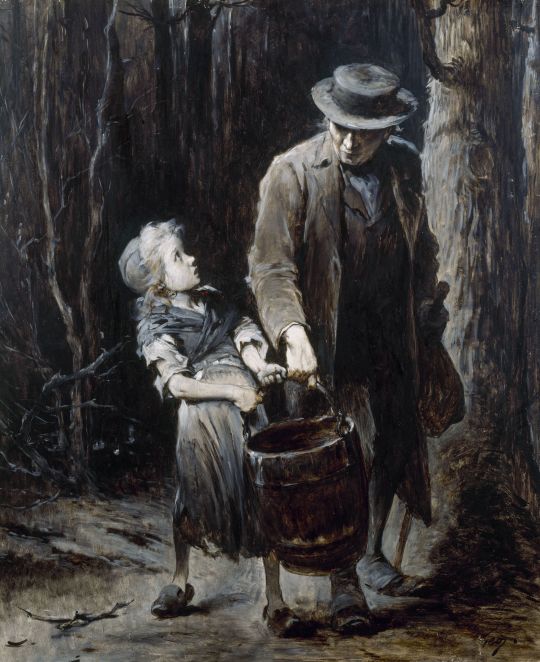
The word “Jean” in french sounds like the word “gens,” which means “people.” So his last name is a pun meant to make you think “viola les gens”/ “here are people.”
The most obvious layer to his name is that Jean Valjean is basically John Doe. He is the anonymous Everyman. His sister’s name is Jeanne, so she’s basically Jane Doe. They aren’t special or exceptional or unusual; they’re just behold! The regular people.
In fact his name is so common-sounding that it's a plot point. Champmathieu, the man who is mistaken for Jean Valjean, has a name that the police connect with his. Javert theorizes that "Champ" is a version of "Jean" in a specific accent, while Mathieu was actually Jean Valjean's sister's maiden name. ("Champ" is also the French word for "field.") The fact that Jean Valjean is a peasant everyman makes it easy for others in his position to be conflated with him.
But the other layer is that this is all an elaborate pun biblical reference!
When Pontius Pilate presents a bound Jesus Christ to the crowd before his crucifixion, he says the words “ecce homo” or “Here is the man!”/”behold the man!”
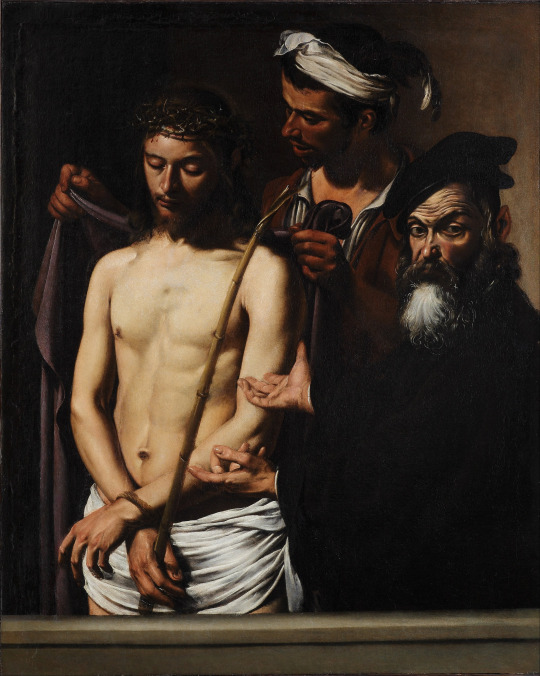
“Voila Jean” or “here is Jean!”/”behold Jean!” is meant to be a reference to that.
During his death scene Jean Voila-Jean even references the “Ecce homo” line explicitly, gesturing at a crucifix and saying:
“Voilà le grand martyr.”
Which Isabel Hapgood translates as “behold the great martyr.”
At another point in the same scene Marius says to Cosette:
“He has sacrificed himself. Viola l’Homme. Behold the man.”
But more references to that biblical moment appear throughout the novel; Jean Valjean is associated with it constantly, all the time. It’s one of his defining biblical allusions. He’ll be trying to live anonymously, or under an alias– and then suddenly his true name and criminal past will be revealed, he’ll be revealed to be ‘the man,’ and some great horrible act of martyrdom will follow.
Sometimes Jean Valjean is the one revealing his own identity, but sometimes Inspector Javert is put into the role of Pontius Pilate. Javert himself explicitly makes that comparison– Jean Valjean as Jesus, Javert as Pontius Pilate– when he’s contemplating suicide.
And this ties into one of the largest differences between the book and the stage musical.
In the musical, “prisoner 24601” is the name that represents Jean Valjean’s dehumanization–while “Jean Valjean” is the name he uses while standing up for his own humanity. He will be called 24601, and proudly declare that “my name is Jean Valjean” to assert he’s still a person.
And while this is a great storytelling choice, it’s almost the opposite of how the name “Jean Valjean” is handled in the book.
Because in the book…. Jean Valjean IS the name that dehumanizes him. Jean Valjean is the name that he’s running from. The name that Javert uses when he’s insulting him, the name that bigots use when they’re threatening him, the name that ignorant people use when they’re mocking him – it’s not 24601, it’s Jean Valjean.
And there’s a special kind of agony to that.
The name that is being used to torture, humiliate, and dehumanize him isn’t 24601– it’s his name.
He thinks of it as a “fatal name,” as a punishment. Living under that name is living in hell. When Jean Valjean is living under one of his aliases, concealing his identity, he thinks:
That which he had always feared most of all in his hours of self-communion, during his sleepless nights, was to ever hear that name {jean Valjean] pronounced; he had said to himself, that that would be the end of all things for him; that on the day when that name made its reappearance it would cause his new life to vanish from about him, and—who knows?—perhaps even his new soul from within him.
It’s no wonder that he ends up internalizing the way society views him, and developing so much fear and hatred of himself. He’s grown to see his name as just….well, ecce homo, behold the man. His name is just the two words people say before they violently punish him.
Names and namelessness are a major theme in Les Mis, and he’s the character who has the most complex relationship with his own names. He has a legal name, but it’s used to torture him, and he has a series of false names he uses to escape torture.
If I were to describe Jean Valjean– one of the most complex characters in all of literature, in one word, that word would be “grief.”
The criminal justice system takes everything from him, including things he wasn’t aware he was able to lose. His name, the last connection he had to his family and his old identity, gets warped into this thing needs to view with fear and horror. The thing society despises isn’t 24601, isn’t a number they’ve placed on him – the thing they despise is Jean Valjean, some intrinsic inherent part of himself. He isn’t hated for what he did, he’s hated for what he is, and that is something he can never escape.
{But speaking of complexity we’ve actually barely scratched the surface of how Jean Valjean reacts to names, because he spends most of the novel living under a series of nicknames aliases. And guess what! Each of these names also has some elaborate symbolic meaning! If you’re interested in more posts covering his different aliases, feel free to leave a comment in the replies!}
[thanks for reading! For more in-depth analysis, check out the @lesmisletters readalong or join our discord server!]
#les mis#les mis letters#relevant to today's chapter!!#not linking the video for this one though#imagine i pronounce pontius pilate perfectly
226 notes
·
View notes
Text
Which Toxic Yaoi is the best






Sequel to the toxic yuri poll. I deeply apologise if some of these are not toxic, i went off of the propaganda
Propaganda under the cut!
BbKaz (Big Boss/Kazuhira Miller)
they have multitudes.. you can ship it as something goofy and fluffy or as the most toxic yaoi of all time and theyre both pretty reasonable interpretations. they go on a date together and have sex in a cardboard box on a beach in canon and a bunch of other crazy shit. their relationship spans 20 years so they span from honeymooning to divorced to one trying to kill the other etc. "love loses" the ship they make me insane
Flash/Reverse Flash
"It was ME Barry, I jerked you off at supersonic speeds so it would seem like you nutted at just a woman's touch!"
Possibly the most toxic yaoi of all time
SuzaLuLu (Kururugi Suzaku/Lelouch Lamperougue)
TOXIC YAOI TOXIC YAOI
SaruMi (Saruhiko Fushimi/Misaki Yata)
Toxic yaoi, obsessive boy joins a gang with his best friend but then his best friend makes other friends in the gang so he joins up with an enemy gang instead. Normal behavior.
Valvert (Jean Valjean/Javert)
They’re so obsessed with each other (especially javert to valjean) it’s like half of the plot. Pinnacle of toxic old man yaoi. Produces the funniest plot point in the show: Valjean (escaped convict in disguise as a mayor and businessman) saves someone by lifting a cart he was trapped under and Javert (cop trying to catch Valjean) goes “Damn girl… you remind me of this guy…. He’s the only guy I’ve ever seen who’s as swole and jacked as you”
Lawlight (Light/L)
"L and Light are the founding fathers of toxic yaoi" is what people WANT you to believe but these poor men are being slandered... You see it's ackshually totally heterosexual to give your bestie (who's also your mortal enemy) a foot massage while he he makes soft little grunting noises and wipes the water droplets from your rain-soaked hair all while a soft melancholic piano track is accompanying this surprisingly tender moment between the two of you- IF it's a religious callback to Jesus and Judas. It's just a Bible reference bro. No homo. 🤓☝
Anyhow don't google the Japanese version of "Playing his Game" (which is called "Inside of him" in Japanese) from the Death Note Musical. I assure you there is absolutely nothing gay about those lyrics.
Wdym people love shipping two mortal enemies with an unhealthy obsessive murderous rivaly??? What is the world coming to... Besides Light is clearly heterosexual. His lack of interest in women is because he's a based sigma male obviously...
and additional reason here but this one is a spoiler
Foot washing scene. The musical. God, they're so obsessed with each other. When L dies Light loses his main drive, his passion- being Kira isn't fun anymore without L, he isn't having a good time even though he won their battle of wits. Light being L's first friend. L being... really, the first person to understand Light. Theyre insane I love them
#bbkaz#reverse flash#suzalulu#sarumi#valvert#lawlight#poll#polls#tournament poll#anime#video games#theatre#dc#comics
227 notes
·
View notes
Text
She [Cosette] would gladly have thrown something at [Théodule] his head.
— Vol.IV - Book.V - Ch.V
He [Valjean] gazed at him [Marius] with inexpressible hatred.
— Vol.V - Book.III - Ch.IV
Love when daughter and father being a HATERE.
106 notes
·
View notes
Text
while i think we SHOULD blame marius, i think pushing valjean away makes sense from him as an emotional response. marius has an expectation and anxiety of rejection, and he deals with his problems by running and fixating on something that will ‘fix’ him. jean valjean is the first character marius can emotionally view as a father— except for maybe mabeuf, who’s now dead. his apprehension no longer has a place in him— of being a good enough son for guillenormand, who now accepts him (though i don’t think marius is over this) or being righteous for his father, after the barricade. he can just be. jvj, as cosettes father, and therefore trustworthy, is the first father figure he can believe in, despite marius’ mistrust of adults. then, jvj says he’s a criminal, and unfortunately his self-esteem making him seem worse than he is… and also, marius believes he kills javert. while marius SHOULD have tried to get more information, his response is to do what he has always done— take action through himself, not authority. when his father(s) could not protect marius, he walked out on his own. if jvj cannot/should not protect cosette, marius will. jean valjean being a criminal is more than him being a bad person— it’s him being a bad father, like guillenormand and theoretically, georges. pushing valjean away is a horrible way to “protect cosette” because unconsciously, it’s to protect himself.
#this is NOT in defense of marius#he’s wrong#he’s just good at deluding himself#and letting his fear get the best of him#and is perpetuating the cycle that has made him this way#les mis#marius pontmercy#jean valjean#idk which segment to tag this as#lm 5.7.2#?#les mis letters#marius def refers to his life as eras#dorian talks les mis
97 notes
·
View notes
Text
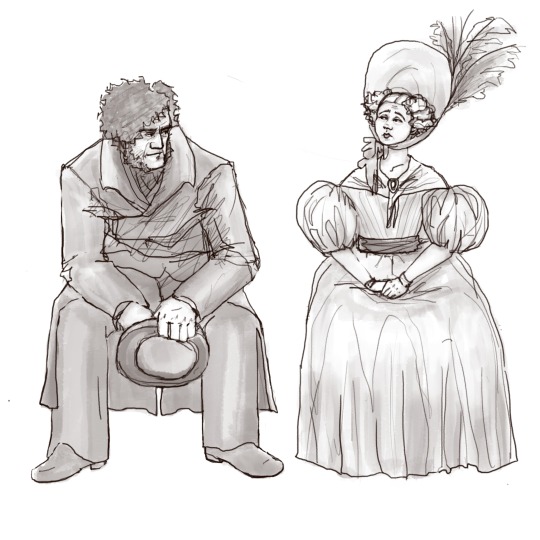
So, I have this wacky Javert & Cosette detective agency AU idea that I’ll probably never write…
Post-Seine Javert starts a private detective agency — reuniting loved ones, shutting down extortion rackets, stopping forced marriages, things like that. He doesn’t make any money because he fails to collect payment on the rare occasion he’s not working pro bono. [Very Angel Investigations, sans vampires … unless?] The work is both penance and its own reward.
Bored of social calls and society dinners, Cosette decides to help him in his work. Javert refuses her, but she keeps showing up. She proves herself useful, as no one ever suspects her of being a double agent, she’s clever, and she can cry on command — which is an incredibly effective distraction. Since Paris’s underworld is already familiar with him from his previous profession, Javert has had difficulty making progress on some of his cases. But Cosette is entirely unknown. Grudgingly, he allows her to help on his smallest, safest, most respectable cases. Which rapidly escalates into her running the place. He’s really not an ideas man.
There are capers! Escapades! Daring rescues! A heart-warming Christmas episode!
Valjean and Marius are given to believe that Cosette’s time is spent volunteering with ladies aid societies. When the truth comes out, Valjean is apoplectic, and it’s the first real risk to his relationship with Javert (well, post Seine, haha), especially when Javert makes it Cosette’s choice whether to continue. Marius’s anger burns out much quicker; that boy is nothing if not easily led.
Meanwhile, Montparnasse has filled the leadership vacuum left by Thénardier and has made great inroads in the Parisian organized crime scene. With Javert foiling many of his more lucrative business interests, Montparnasse decides it’s time to deal with with him more permanently...
Other odds and ends for this ‘verse:
Javert accidentally adopts some urchins when he attempts to cultivate them as informants, but they keep showing up like stray cats when they realize he’ll feed them.
Having heard it in her tenderest years, Cosette quickly picks up the accent and argot of the street and becomes a mistress of disguise.
She also purchases an umbrella with a stiletto hidden in the handle, which she mostly uses to underline her better rhetorical flourishes.
Whilst Javert is not an easy man to like, Cosette appreciates his honesty. Granted, that honesty is couched in the most pessimistic, condescending and insulting way imaginable. But after her father and her husband gaslighting her for years, it’s a relief to not second guess the information someone gives her.
They both appreciate having someone to commiserate about Jean Valjean’s idiosyncrasies with. “You know the way he clears his throat when he disapproves, but won’t say he disapproves — and if you ask him if he disapproves, he’ll deny it?” “I know it very well!”
After Jean Valjean is finished being furious, he moves right on into being jealous. He wanted them to get along, but not quite this well. He of course would rather eat glass than admit it.
Also, as many of les amis survive as I can reasonably get away with. Definitely Courfeyrac, because I like him. Probably Bahorel, in case they need some additional muscle when working a case. And Joly because they’d need someone with a medical background to identify the cause of death/provide medical aid. Also no one should die with a cold, talk about insult to injury.
Anyhoo. Everybody lives happily ever after with a gentle ’90s TV glow. Fuck you, Victor-Marie Hugo.
93 notes
·
View notes
Text
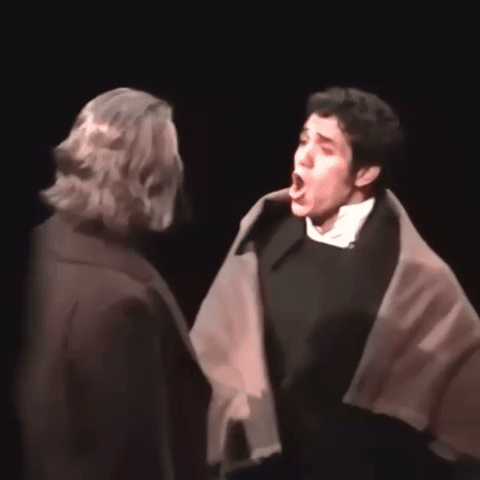





I get the whole appeal behind the “JVJ despises Marius” thing, but in the context of the musical, their relationship being more tender is so SO good
Marius being so excited to have a father again, only to lose him immediately after … valjean saying goodbye to “the son [he] might have known” 🙅🏻♂️
#les mis#Les miserables#Gifset#jean valjean#marius pontmercy#rob houchen#Drew sarich#daniel koek#rest of actors are in alt text#I know it is silly to care for these guys relationship this much but TO BE CRINGE IS TO BE FREE#this scene is SOO so so so so so underrated#the boot where they hug literally knocked me the hell out I was holding back tears and everything#my gifs
97 notes
·
View notes
Text
still chewing this one over so hopefully this makes sense but one very minor running thing I feel like we get w jean valjean is that without disliking women or even believing that they're in any way unequal to him he. hm. for the most part doesn't have much normal contact with adult women after his sister (and presumably none for the 19 years he was in prison) which means that. not that he doesn't understand women so much as i feel like idk. he makes the mistake of unconsciously assuming men-are-from-mars-women-are-from-venus style that he doesn't understand them (being aware of that lack of contact & under the impression women are fairly different to men), and because he's a guy who wants to understand things & is largely self taught (often from books) especially wrt social niceties, he ends up being very credulous, in that presumed lack of understanding, of commonly held beliefs & traditional, societally reinforced ideas of gender rolls & gender characteristics, and this sometimes ends up ultimately hurting women around him despite his genuine good intentions
like obviously firstly in montreuil-sur-mer where he wants the female workers to have "pure morals" and gives them a separate workroom to the men to "remain discreet" which I think he genuinely intended as a means of making it a good work environment for the workers -- women can have privacy & focus on work & nothing uncomfortable or untoward is being brought into the workplace etc -- but as we know this backfired horrendously because it essentially resulted in fantine being fired for having a child out of wedlock & everything she went through after. and given his reaction he doesn't seem to have ever considered this a potential effect of his rules -- like he doesn't seem to have understood how those sorts of rules end up ultimately punish the women involved more than anything
and the other main instance of course is with cosette and his assumption that essentially a woman has a father, & then she has a husband & having a husband no longer needs a father (this is strengthened a lot by his own feeling of his own taintedness -- it's not the main thing responsible for what happened by any means. but it's a part of it) & this assumption is incredibly hard on her!!! she obviously doesn't see it that way at all! but it never seems like it occurs to him not to think of it in that framework bc essentially society in general sees it that way
idk I guess what I find interesting abt this is that it's a big blind spot in a guy who's otherwise extremely willing to question social biases & generally likes to take people all on a level as just another sort of person like himself. again I think in his general behavior towards women interpersonally there's nothing bad & in fact there's a lot of genuine respect there & probably willingness to learn even (in fantine 's case), but it's like he just never worked out that these ideas about gender are about as true & helpful as ideas about class or criminality etc etc
#idk does that make sense. I'm trying to work out how to phrase it#some of this is also of course just hugo's own approach to women & gender roles which is sometimes uh. 😑#thoughts#les mis#i also kind of feel like his not being attracted to women makes him conscious of this sort of a remove he's at from normal relationships to#women socially speaking which maybe makes this worse <- not that that is a Real distance or cause for misunderstanding so much as#his perception of it makes him more uncertain of it. i guess. if that makes sense
69 notes
·
View notes
Text
Les Misérables fic recommendations (canon era edition)
I’ve made a Les mis fic rec post before but I cannot find it for the life of me. Anyway I love canon era, here are some of my fav fics for a good variety of ships (including platonic!)
Not Even Miracles by everyonewasabird (@everyonewasabird)
Rating: M
Word Count: 113,715 (incomplete)
Ship/s: Combeferre & Courfeyrac & Enjolras, Cosette/Courfeyrac/Marius, Cosette & Jean Valjean
Summary:
Post-barricade survival fic about found family. Combeferre searches for Enjolras, Cosette tries to save her father, Enjolras atones, and Courfeyrac struggles to come to terms with all of it.
Not an everybody lives AU, but I promise there's a happy ending for everyone who made it out.
Notes: PERFECT STUNNING GORGEOUSSS!! Do not let it being uncompleted put you off because what is there is some of the best fic I’ve ever read. Perfect if you’re like me and enjoy fics that focus primarily on platonic relationships. Possibly my favourite Cosette and Combeferre characterisation. Just read it
Annoyances by Secretmellowblog (@secretmellowblog)
Rating: G
Word Count: 29,339 (incomplete)
Ship/s: Javert & Jean Valjean, Javert/Jean Valjean
Summary:
Jean Valjean, exhausted from the barricades and the sewer, somehow finds the strength to drag Javert out of the Seine. He has no strength left for anything else. He collapses from exhaustion on the quai near the Pont Au Change as the situation rapidly devolves into tragicomedy.
Notes: Yes another incomplete fic but I promise it’s so worth it. The author manages to imitate Hugo’s style really well as well as balancing humour with the characters’ rapidly deteriorating mental state. Not very shippy so far so I’d recommend it even to my non- Valverters. Also another fic with great Cosette characterisation which is very important to me.
No Weapon But Hate by Carmarthen
Rating: T
Word Count: 5,075 (complete)
Ship/s: Unrequited Javert/Jean Valjean
Summary:
Jean Valjean realizes that there is yet more that Toulon could take from him.
Notes: Read the warnings on this one because it is pretty heavy but a really interesting exploration of Jean Valjean’s time in Toulon. A lot of adaptations fail in showing this part of the story “on screen” but I loved how this author did it, you really get into JVJ’s head. Also really well researched, I love a fic with a reference list at the end.
Nature in Defiance of Nomenclature by BenevolentErrancy
Rating: T
Word Count: 2,352 (complete)
Ship/s: Combeferre & Enjolras, mentioned Enjolras/Grantaire
Summary:
Asexual-homoromanticism can be a complex enough matter when a name exists for it. When faced with such inclinations and a 19th century approach to sexuality matters become more obscure
Notes: A beautiful friendship centred fic. I love reading about discussions of queerness in a pre “homosexuality” (the term not the concept) world, it’s always so fascinating to me. This fic is part of a wider series that I haven’t read yet but looks good.
Driven Like The Snow by tenlittlebullets
Rating: T
Word Count: 2,897 (complete)
Ships/s: Éponine/Montparnasse, one sided Éponine/Marius
Summary:
The night after the Gorbeau robbery, Eponine wanders the streets of Paris.
Notes: A very very depressing Éponine character study that I absolutely adored. I loved how the writing style followed a stream of conscious as Éponine spends the night out in the cold, her thoughts getting less and less coherent. Montparnasse and Marius are discussed but it’s mostly just Éponine.
Sensible Depravity by thatbug
Rating: M
Word Count: 2,806 (complete)
Ship/s: Grantaire & Combeferre, Combeferre/OMC
Summary:
Grantaire is delighted to discover that Combeferre is in a relationship with a man.
Notes: Severely underrated fic. Really funny and full of canon-typical Grantaire awfulness (like seriously, he’s a real dick in this one) but also some fun exploration of 19th century queer identity.
On Liberty and Love by labingi
Rating: G
Word Count: 3,668 (complete)
Ship/s: Enjolras/Jean Prouvaire
Summary:
Jehan and Enjolras discuss love and liberty (and gay rights--no, this is not a modern AU).
Notes: I love a good rarepair and this is a very good rarepair. Takes place in that awkward period after the 1830 revolution and of course has some interesting exploration of queer identity in the 19th century, and it blurs the lines between romantic and platonic relationships which is always fun.
on your way up to the light by ryfkah
Rating: T
Word Count: 6,554 (complete)
Ships/s: Éponine & Jean Valjean
Summary:
Eponine throws a note at an old man. She doesn't anticipate the consequences.
Notes: Just a really delightful fix it fic with amazing characterisation of both the main characters. I loved the parallels between Éponine and JVJ and how they were able to come together to give each a fresh start.
Some Friendlier Sky by AMarguerite
Rating: T
Word Count: 124,800 (complete)
Ships: Courfeyrac/Cosette, Joly/Musichetta, Cosette & Jean Valjean (not tagged but they feature heavily)
Summary:
Courfeyrac falls through the roof of no. 7 Rue de l'Homme Armé, taking down not only the ceiling, but the carefully built walls Valjean has constructed around himself and Cosette. Wacky hijinks ensue.
Notes: This really sold me on Courfsette as a ship and now I’m devastated they don’t really have any more fics. Besides our two leads, Valjean gets explored really well in this fic. I also really enjoyed Courfeyrac’s family in this (him being one of many siblings just makes sense to me) as well as his friendship with Combeferre and Enjolras. The balance of humour with some genuinely serious moments is done to perfection and the author clearly knows their 19th century French history. Also for all my Marius lovers, he gets a relatively happy ending, don’t worry! Genuinely cannot recommend enough.
The Stranger at Rue Plumet by sylvie_rue (@ruedesfillesducalvaire)
Rating: M
Word Count: 15,354 (incomplete but updated recently)
Ship/s: Cosette/Éponine, minor Javert/Jean Valjean, Éponine & Jean Valjean, Cosette & Jean Valjean
Summary:
Éponine, dressed as a boy, is Montparnasse's reluctant accomplice for a night of criminal business. When their attempted robbery goes wrong, Montparnasse flees and leaves Éponine in the hands of their would-be victim. But the old man is merciful, as it turns out: he offers to help her, to give her a home and send her to school. Éponine knows he would surely rescind the offer if he found out her real identity: not only a girl, but a Thénardier. So when she accepts, she knows what it will cost her: she is no longer Éponine, but Émile, a boy. After settling in at the house on Rue Plumet, though, Éponine finds herself increasingly drawn to her rescuer's daughter, Cosette, who knows her only as a young man...
Notes: Unlike the previous rec, this fic does not have a happy ending for Marius but it does have genderbending lesbians which is way better. Every new update of this fic has taken me by surprise in a good way. I am of course loving Éponine exploring gender and sexuality in the 19th century and the complex layers of her relationship with Cosette. Really can’t wait to read more!
#les mis#les misérables#fic recs#fic reccomendations#les mis fic#les mis fic recs#valvert#enjoltaire#courfsette#eposette#éposette#mine
38 notes
·
View notes
Text
so cosette is a pretty kickass character given the time period that she was written in, but her character has so much untapped potential. hugo unintentionally wrote such a tragic character. just imagine cosette with a slightly different mindset towards her “happy ending”:
- the constant feeling of repression, whether as a slave to the thénardiers, a schoolgirl at the convent, a lonely teen on rue plumet, or a wife in the gillenormand household
- pushing down her “bad feelings” because that was never something she and valjean learned how to talk about
- being unable to shake her passive nature that stem from an abusive childhood
- “sweet fifteen” for fuck’s sake, cosette is a child and marius is a grown man (yes I know it was a different time, but I still want her to run as fast as she can)
- being weirded out by marius following her home…like to the point that she and valjean are literally forced to move
- her outrage over marius blaming her for the wind lifting her skirt for half a second (which is canon anyway)
- escaping the isolation of rue plumet, only to wonder if being immediately married off at 17 was really the better option
- the religious guilt over not feeling like the pure and untouchable angel that everybody seems to think she is (like seriously hugo, we do not need paragraphs on how modest teenage cosette is even while getting dressed in the morning)
- never knowing about tholomyès’s abandonment and the likely half-siblings she has out there ??
- the rage towards marius and valjean for keeping her own past from her
- like this is HER father and HER husband. they should be consulting with HER, not teaming up to decide what’s “best” for her
- the betrayal of not even knowing fantine’s name until valjean’s very last moments (after she had spent years begging him for the tiniest scrap of information)
- the unbearable guilt about all of these feelings after her father’s death
- not being able to forgive marius for taking it upon himself to remove her father from her life (the same thing that his grandfather did to him ??)
- hating herself for letting him (the brick has a short chapter on cosette sensing marius’s “will” and not resisting)
- again. probably the result of her passive nature from a childhood of abuse and repression.
- little fragments of her childhood slowly coming back to her (more than just the vague images and nightmares that she has in canon)
- never knowing that she came face-to-face with her former abusers ?? and that they almost killed her father ?? and that they have close ties with her husband ?? and that they have been in their home ?? where she is supposed to feel safe ?? and nobody told her ??
- not knowing how to deal with any of this because nobody tells her anything
- never quite understanding who she is or what she’s suffered
in conclusion, cosette has a lot of healing to do.
93 notes
·
View notes
Text
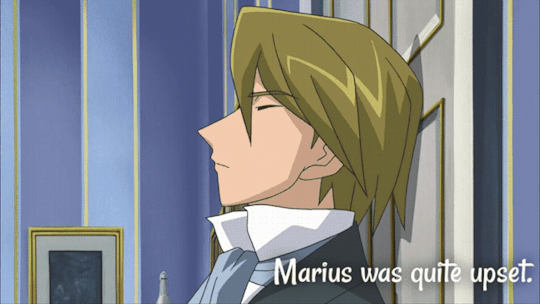
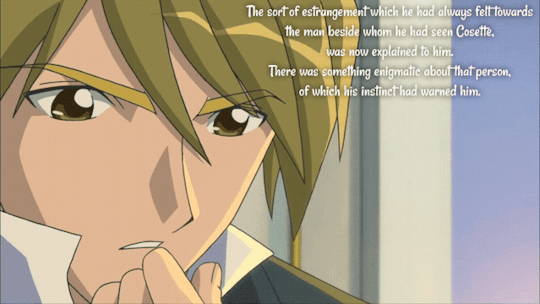
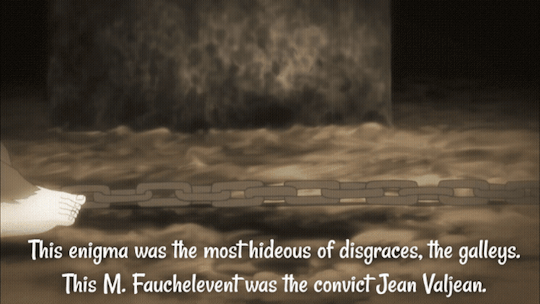


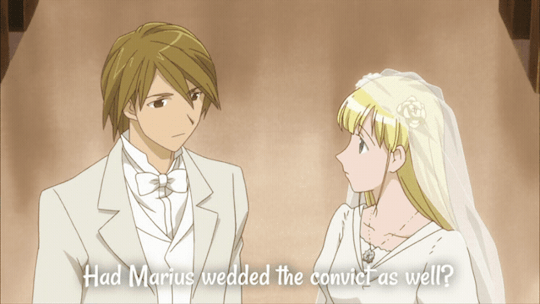
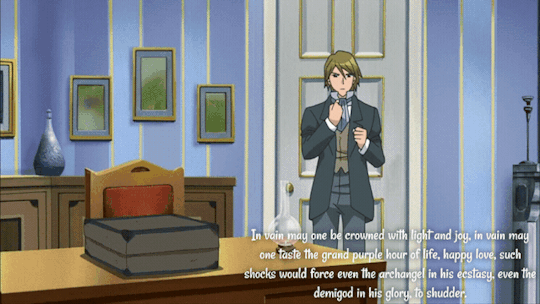
Marius after Valjean's Confession. Volume 5, Book 7, Chapter 2.
Clips from <Il cuore di Cosette>.
#Les miserables#les mis#My Post#Marius#Jean Valjean#Cosette#The Lark#Lark and Booby#Father and daughter#Owl and Wren#Valjean's Confession#Please Marius...#Ah... Marius...#His crimes are plentiful and some even forgivable!#But being complicit in slowly killing my beautiful babygirl Valjean of sadness and grief is where i draw the line.#Why did you do That Marius?#Marius must be scolded by his wife for what he did for his father-in-law...#The Brick#Il cuore di Cosette#Les Mis Letters
18 notes
·
View notes
Text


ohhhhhmy god oh my god guyssjsjaidbwisjsis IT HAPPENED I SAW IT AND IT WAS AMAZING
Notes:
Act I
I NEED TO MARRY ALFIE BOE SOOOOO BAD BRUH YOU DONT EVEN GET IT
Alfie’s so short I forgot about that lmao he’s so baby
I do really really really love Michael but I can already tell that Javert is not exactly his thing. He’s too whimsical- too Marius. Super glad he gets to do something with Alfie tho <333
Jeremy (I think) rocked the bishop omgggggg
I WAS NOT EXPECTING KATIE HALL TO BE HERE CHAT- soprano Fantine is such a foreign concept to me but she was gorgeous
THANK YOU BOEBALL VALVERT FOR BEING THERE FOR ME I LOVE MY BOYFRIEND AND HIS BOYFRIEND
THENARDIERS ARE SO FUNNY I’ve never seen funnier thenardiers. He called Cosette Baguette when Valjean took her away
Also at the beginning of the bargain when Alfie started singing Madame T went “oh he’s got a lovely voice tho”
COSETTE NEW PINK DRESS IS SO PRETTY!!!!! It matches Marius’ bow :))))
Ok both Eponine and Cosette were mixed bags for me- I liked them most of the time, but there were a couple times their voices felt a bit… nasally? They were both very pretty tho :)
James D Gish is beautiful. My dad says he’s the second coming of Ramin Karimloo and im inclined to agree
Gavroche is king shit as per usual
They had stars in stars omggg. ALSOOO at the end the lights make it look like he has wings. Probably unintentional but he’s soooooo fallen angelcore
As much as Michael doesn’t fit Javert, his Stars really is amazing
WE GOT ENJOLTAIRE CRUMBS 👏👏👏 The entire pause between ABC Cafe and Red & Black they were just looking at each other forever
As much as I do love enjoltaire, im an even bigger fan of Gavroche and Grantaire’s dynamic. It was the main thing I noticed about R’s character (even with Kyle Adams playing him) and I’m so happy that it’s in other productions
No Javert barricade outfit in one day more :(
Three flags??? In this economy????
Act II
Okay I did genuinely forget about the barricade outfit but it did come back! It’s different from the Staged Concert, more greenish-black and I think he has his hair down- there’s at least some strands loose on the front
OKAYYYY IM REALLY SURE TGAT BEFORE R STARTED HIS SOLO IN DRINK WITH ME HE WENT AND HELD ENJ’S HAND FOR A BIT- and after he sang and Enj left Gavroche ran over and gave him a hug it was so sweet
Alfie Boe Bring Him Home is still my favoritest thing in the entire world. I owe him my life im so serious he was my top artist for a reason
Enjolras did the Aaron Tveit “until the earth is free” opt up it was amazing
They cut Gavroche’s individual death scene which was either for better or for worse because that’s the one that always gets me crying, so I just teared up at the end
When Javert let valjean and Marius go from the sewers he turned around as if he was gonna follow them, paused, screamed, and put his head and his hand
Dude michael ball does the best suicide scene he’s so unhinged and skdjaidhaisjsj
EMPTY CHAIRS BRO. At “phantom faces” the Amis all stood up in their places in their seats, with Enj, R, and Gavroche on the center balcony right by the conductor. Also at this point he begins to scream with anger at his survival. I’ve never thought about angry Empty Chairs, but it works so well and I need to see it more
Valjean in AHFoL Reprise made me so sad bro. Insert my post about him and Donna Sheridan but add that they’re so attached to their daughter (Amanda Seyfried) and kinda don’t want to let her go to get married
The audience clapped along to Beggars at the Feast. Don’t know if we were allowed to, but we did anyways
When Marius tells Cosette her father is a saint Valjean just shakes his head no oh my god 😭😭
HE DID THE NICK CARTELL NOSE BOOP WITH COSETTE
THE BISHOP COMES UP BEHIND VALJEAN WHEN HE DIES AND VALJEAN GIVES HIM THE BIGGEST HUG EVER OMFGGGGGG
During bows when Michael came up to bow with Alfie they had to switch sides so that Michael could be on the left and Alfie could be on the right. Order has been restored to the world
In summary: Amazing show god I love Les Mis!!!!! Alfie Boe is the only one who can save me <3333
29 notes
·
View notes
Text
The moment where Eponine prevents her father/his gang from breaking into Valjean and Cosette's house is so fascinating? Especially because the musical's portrayal of it is so different from the novel's. Within the musical, Eponine threatening to scream is this very straightforwardly heroic moment. In the novel, it's portrayed as more morally complicated? She plans to scream in order to draw the attention of the police; she does this while boasting about how she's suicidal and doesn't care if everyone here, including herself, ends up dead. It's framed in this very morally ambiguous way-- there are all these parallels drawn between Eponine and Javert, which is never a good sign; she's compared to a monster, a barking dog, and a ghoul. The fact that she plans to call the police, specifically, is also a big point in the book? Eponine isn't aware that Valjean is also a criminal, and that drawing the attention of the police might also put Valjean in danger. This makes the plot point far more like the "Patron Minette ambush" subplot earlier, the one where Marius was debating over whether or not to give the signal for the police to come in. Just like in that subplot, Eponine ends up being the one who gives the characters a "middle road." Just as Eponine's letter gives advanced warning to Patron-Minette (giving Valjean time to escape in the confusion), Eponine's threat of calling the police here outside Rue Plumet manages to prevent the robbery without the police coming in.
Within the novel she's being brave and heroic, but it's also framed as being deeply morally complex and self-destructive. And I'm never quite sure how to feel about it!
288 notes
·
View notes
Text
Round One: A1: Poll Four
Wacky Coffin Heist can be found in the Brick, at: Several chapters of 2.8 (Starts at 2.8.4)
Myriel getting his position by saying something smart to Napoleon can be found in the brick, at: 1.1.1
PROPAGANDA:
Wacky Coffin Heist: (Fun fact! This was BY FAR the most submitted moment!! :D)
Not only does Jean Valjean pull this wacky coffin heist escape, he’s EXCITED to do it. Like his buddy Fauchelevent keeps going “I don’t know sounds dangerous” while Jean Valjean keeps smiling and going “it will be fine! :D it will be wonderful! :D”. It’s one of the few times in the book we see the unbearably sad beast get genuinely happy about something that isn’t Cosette . It’s an unhinged heist but even more unhinged because it brings him this unexpected joy
He comes up with the plan himself, then almost dies because of it. King shit.
( @pontmercysamis (no propoganda, just wanted to be credited for being one of the people who submitted this one :) )
(Submitted by @blatherby ) Most relevant quotes, IMO 2.8.4: You can pick whichever translation you like best for the quotes. Here’s my favorite specific line: Jean Valjean eut un de ces rares sourires qui lui venaient comme une lueur dans un ciel d’hiver. (Hugo) Jean Valjean gave way to one of those rare smiles which lighted up his face like a flash from heaven in the winter. (Hapgood) This Unbearably Sad Beast who basically never smiles (especially not without it being described a sad smile) is now having his smile compared to: - the aurora in a winter sky (Wilbour) - a sunbeam in a wintry sky (Wraxall) - a flash from heaven in the winter (Hapgood) - sunshine breaking through a winter’s sky (Denny) - a sunrise in winter (FMA) - a ray of sunshine in a winter sky (Rose) - a gleam of sunlight in a winter sky (Donougher) … because he’s so ecstatic *over getting buried alive!* Something is Wrong with him (affectionate). Okay, to be fair, he doesn’t *actually* want to be buried alive (… at this point in the book), based on his reaction to the plan going awry later. But he’s having a blast with every aspect of this except for the actual suffocating to death part. His joy over this is so unhinged that—well, here’s Fauchelevent at the end of that chapter: “Agreed, father Fauchelevent. It will all be all right.” “Provided nothing goes wrong,” thought Fauchelevent. “What if it all goes horribly wrong?!” (Rose translation) And here’s Fauchelevent the next day, in the next chapter: Fauchelevent limped along behind the hearse, happy as can be. His two mysteries, his two twin plots, one in league with the nuns, the other with Monsieur Madeleine, one for the convent, the other against, had succeeded together, one after the other. Jean Valjean’s calmness was one of those powerful tranquilizers that are contagious. Fauchelevent was no longer worried about whether they would bring it off. […] Fauchelevent felt completely secure. As the convoy entered the avenue leading to the cemetery, Fauchelevent looked at the hearse, happy, and rubbed his big hands together, muttering to himself: “Not a bad joke!” (Rose) JVJ is so happy and calm over pretending to be dead that he’s literally acting as an anxiety medication. (I propose that we send JVJ on coffin heists and bottle his powerful calmness. Everyone wins!)
the entire coffin heist is so wacky but that bit specifically made me cackle. I dunno I like the juxtaposition
Myriel getting his position by saying something smart to Napoleon:
I don't remember which translation it was that had him say something like "You sir, are looking at a good man, but I am looking at a great man", but Myriel is such a fun character, I love him
#les miserables#mostunhingedmomenttournament#les mis#jean valjean#Fauchelevent#Bishop Myriel#2.8.4#1.1.1
35 notes
·
View notes